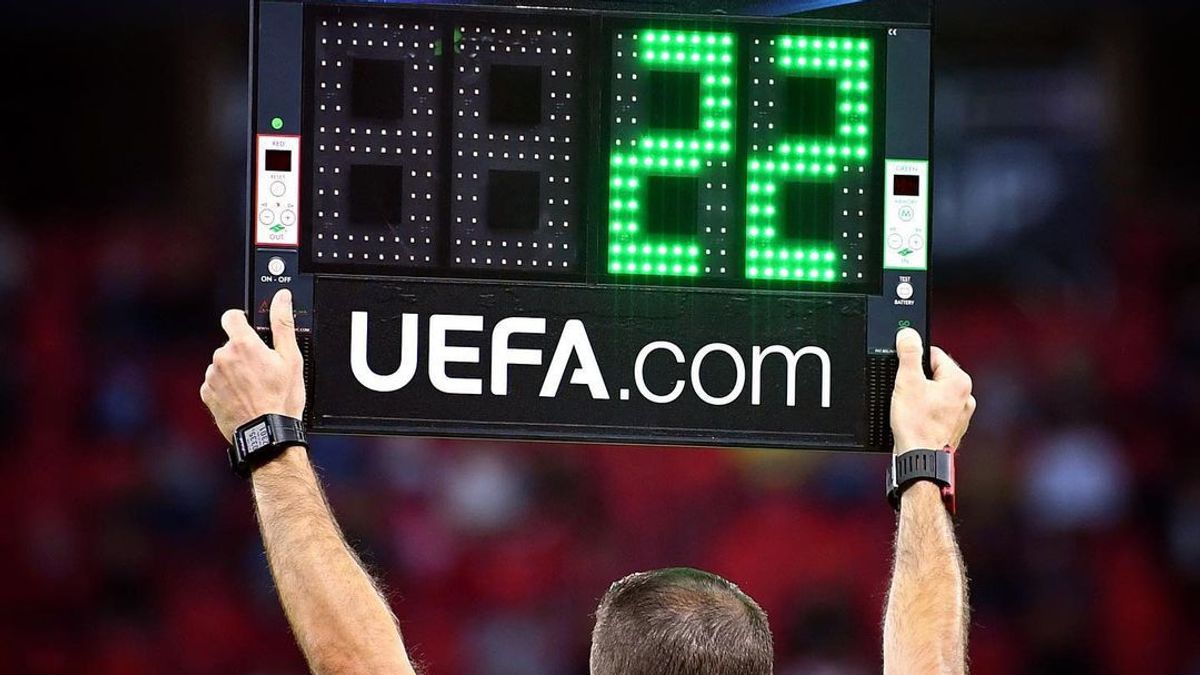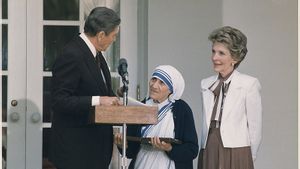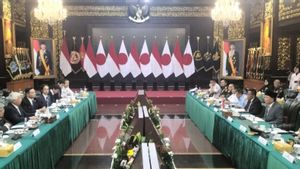JAKARTA - The Federation Internationale de Football Association (FIFA) was the only soccer body in the world at that time, when a meeting in Bassel, Switzerland initiated the formation of a European football body. This meeting is the historical root of the Union of European Football Association (UEFA), an association that has influenced the history of European football.
In the early 1950s, Dr Ottorino Brassi, former secretary and president of Federazione Italiana Giuoco Calcio (FIGC) met with two of his colleagues, Henri Delaunay from France and Jose Crahay from Belgium. They gathered in Bassel, Switzerland. Like Brassi, Delaunay and Crahay are associated with football federations in their respective countries.
The plan to establish a European football federation was initiated. FIFA provides full support. Indeed, since its founding May 21, 1904, FIFA is the only soccer body in the world. One month after FIFA's 50th anniversary, UEFA was founded in Basel on 15 June 1954. The inauguration of UEFA also took place on the historic day ahead of the 1954 World Cup in Switzerland.
Even though everything is related to Switzerland, UEFA's first headquarters actually stands in Paris, France. Five years later, in December 1959 to be precise, UEFA's headquarters was moved to Bern, Switzerland. History records two moves of UEFA headquarters: 1962 and 1974. UEFA headquarters had moved to Nyon after 35 years based in Bern.
Nyon is a small town in Western Switzerland. It is on the shores of Lake Geneva. When moving to Nyon, UEFA leased part of a building owned by Providentia, an insurance company. However, the office was only temporary while waiting for the completion of the construction of a larger headquarters, which was completed on September 22, 1999 and stands today.

The first UEFA president is Ebbe Schwartz. He is the former chairman of the Danish football federation. Schwartz was elected on June 22, 1954. Meanwhile, one of the initiators of UEFA, Henri Delaunay served as UEFA's first general secretary. Henri was succeeded by his son, Pierre Delaunay on June 8, 1956.
Reported by Tirto, at the beginning of its establishment, UEFA had 25 European football associations that joined as members. That number doubled when the Soviet Union and many major Eastern European powers broke up. To date, there are 55 registered football associations under UEFA.
Goal of establishing UEFA
UEFA has the goal of promoting, protecting and safeguarding football at all levels. That goal is what it was called when it was founded.
Quoted by The Belle Brigade, UEFA, simply described as "Guardian of Football in Europe." UEFA today is trusted to carry out missions to maintain unity, peace and solidarity through football.
Through football, UEFA is also obliged to transmit the spirit of fair, competitive play, to get rid of racial, political, religious, and gender discrimination. The work to protect that goal is carried out by UEFA through the code of ethics and the official rules of the soccer game.
UEFA plays a vital role as the heart that supports the work of all football instruments in Europe. These instruments include national football federations, players, and organizing all competitions that have a direct impact on the football business.
[/ read_more]
UEFA principles and values: Eleven Values

Reporting from the official website of UEFA.com, UEFA has eleven principles and philosophical values which they call 'Eleven Values'. What is that?
Football above allFootball should be the first and foremost priority in any consideration that UEFA take. Soccer in question is a basic game before it becomes a product, enters the market or changes form into a business. Only football. Feet and ball.
Pyramid structure and subsidiarityAt the international and European levels, sports autonomy is reflected in the pyramid structure of football. FIFA, UEFA and other national football associations work together on the lines of respect for the principle of subisidiarity.
The principle of subsidiarity protects the inferior football associations from the intervention of the higher governing bodies. This allows UEFA to defend the interests of football in the best possible way.
Unity and leadershipUEFA doesn't work in a dictatorial fashion. UEFA maintains strong leadership while working in a spirit of consensus. All based on agreement.
Apart from the national football body, UEFA always involves other instruments, including league organizers, clubs, and players' representatives in making every decision. The discussion is usually held through the Professional Football Strategy Board.
That way, democracy will be maintained. And most importantly, the Executive Committee can make decisions that are right and fair for all, including football fans.
UEFA places football fans and spectators as an important element. UEFA believes, without fans and spectators, professional football would not exist.
Governance and autonomyUEFA and all other member associations are committed to creating good governance. It means openness, democracy, transparency and responsibility.
In this principle UEFA supports an autonomous sporting structure. In this way, the soccer body is free from political intervention. The national football governing body can make major decisions without interference from the government.
Grassroots football and solidarityFootball is a very down to earth sport. It can be played anywhere without restrictions. Top professional level, if today we look at the celebration of Christiano Ronaldo or Erling Haaland madness, they are only the tip of the iceberg.
UEFA is determined to continue to care for football from that bottom point. One way is to strengthen solidarity.
Local, regional and national identities must be maintained in accordance with applicable laws. That way the future of football can be protected. Football can also benefit society as a whole.
Protection and education of young playersUEFA has a responsibility, both professionally and morally. International transfers for minors carry many risks.
Don't forget that players under the age of 18 are children or teenagers. UEFA is determined to protect the future of children in football and stop sending them to foreign countries when they are too young.
The integrity of sports and the betting marketThe betting market has an advantage. On the other hand, UEFA is aware of the risks, including those related to the integrity of the competition.
UEFA is committed to safeguarding and protecting the proper integrity of sport and competition while safeguarding the true principles of the game of football.
Financial fair play and regularity of competitionFair play is everything. Not only inside the field, but also outside. The issue of financial fair play is an example off the field. Clubs are required to operate in a transparent and responsible manner in order to protect the spirit of competition and the club itself.
Financial fair play means clubs are not involved in piling up debt to compete with other clubs. In fact, clubs are required to compete by maximizing the resources they have.
National teams and clubsThe national team and the football club are important complementary elements. UEFA will continue to be committed to maintaining and strengthening that balance.
It is undeniable that the development of football at the national, European and international levels depends on the development of the club
RespectThis is the main principle of football. Respect for the game, integrity, diversity, dignity, health of players, rules, referees, opponents and supporters.
UEFA affirms its message: zero tolerance for racism, violence and doping. Football must unite and transcend differences.
There is no difference in skin color behind the uniform. And for UEFA, racism and any other form of discrimination will never be tolerated.
European sports system specificationsUEFA is a European body fully committed to the European sports system. The hallmarks of the European sporting system are promotion and relegation, the principle of solidarity and open competition and equal opportunity for all.
Sport, especially football is all about these things. UEFA is committed to continuing to protect this system because sport is not just a business like everyone else and UEFA cannot allow it to be treated like that.
[/ read_more]
Various competitions under UEFA

As explained above, competition is an important instrument for realizing all the principles and values contained in Eleven Values. UEFA currently has 19 competitions at various levels
ClubChampions League, Europa League, Super Cup, Youth League.
NationalEuropean Qualifiers, UEFA EURO, UEFA Nations League, Under-21
WomanUEFA Women's EURO, FIFA Women's World Cup, UEFA Women's Champions League, Women's Under-19, Women's Under-17
Junior and amateursUnder-19, Under-17, UEFA Regions' Cup
FutsalEURO Futsal, FIFA Futsal World Cup, Futsal Cup.
* Read other information about football or read other interesting articles from Yudhistira Mahabhharata.
MEMORY Other[/ read_more]
The English, Chinese, Japanese, Arabic, and French versions are automatically generated by the AI. So there may still be inaccuracies in translating, please always see Indonesian as our main language. (system supported by DigitalSiber.id)









